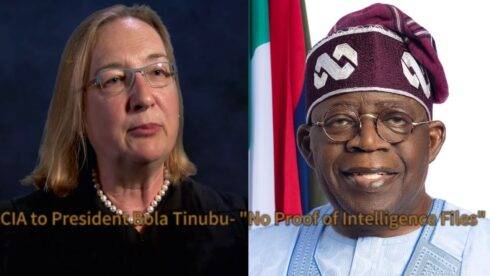Bola Tinubu will not face the release of any CIA files, as a U.S. federal judge has ruled that the Central Intelligence Agency (CIA) is under no legal obligation to confirm or deny whether it possesses intelligence on the Nigerian president. The ruling, delivered on April 8, 2025, by Judge Beryl Howell of the U.S. District Court in Washington D.C., affirms the CIA’s right to invoke the “Glomar response”, a legal doctrine allowing intelligence agencies to remain silent on the existence of records.
Tinubu, whose history has drawn increased international scrutiny, was at the center of a Freedom of Information Act (FOIA) lawsuit filed by American transparency advocate Aaron Greenspan and Nigerian journalist David Hundeyin. Their request aimed to unearth any files linking him to alleged criminal activity in the 1990s, including suspected involvement in narcotics-related financial dealings.
Bola Tinubu’s CIA Involvement Dismissed Through “Glomar” Defense
Tinubu’s purported links to the CIA were decisively dismissed through the application of the Glomar defense, a seldom-invoked but powerful legal shield used in sensitive intelligence cases. According to Judge Howell, the plaintiffs failed to present evidence proving that the CIA had ever acknowledged possessing files tied to Tinubu, thus validating the agency’s refusal to engage under FOIA.
Tinubu’s opponents argued that the nature of his past warranted full transparency, particularly as he serves as the sitting president of Africa’s largest democracy. However, the court stressed that speculation does not meet the legal threshold for disclosure, especially when national security protocols and agency confidentiality are involved.
Bola Tinubu’s Transparency Challenged by FOIA Advocates
Bola Tinubu’s history became a focal point for transparency advocates who pushed to uncover any official U.S. documents regarding his alleged past. Aaron Greenspan and David Hundeyin contended that the U.S. government had a civic duty to release any material implicating or exonerating Tinubu due to the global significance of his presidency.
Tinubu’s case has long been a subject of investigative journalism, with concerns centering around alleged money laundering and drug-related associations during his time in the United States. Despite the dismissal of the CIA, the campaign for disclosure continues through active FOIA requests targeting other federal agencies with known investigative history on Tinubu.
Bola Tinubu Still Under Review by FBI and DEA After Court Ruling
Bola Tinubu is not completely free of scrutiny, as the same court has directed the Federal Bureau of Investigation (FBI) and the Drug Enforcement Administration (DEA) to continue combing their archives for potentially disclosable materials. Unlike the CIA, these agencies had previously acknowledged some level of investigation involving Tinubu, most notably during the early 1990s.
Tinubu’s past came under renewed examination when documents released in 2023 and 2024 revealed that he was linked to a probe concerning narcotics proceeds, resulting in the civil forfeiture of $460,000 from his U.S. bank account in 1993. Judge Howell has now mandated both the FBI and DEA to provide a detailed status report by May 2, 2025 on any additional records that may be of public interest.
Bola Tinubu’s 1993 Chicago Forfeiture Resurfaces in Legal Discourse
Bola Tinubu was the subject of a civil asset forfeiture case in Chicago in 1993, a legal matter that has resurfaced amid his presidency and recent court proceedings. Though never criminally charged, the forfeiture — which involved the surrender of over $460,000 allegedly tied to narcotics trafficking — continues to shadow his political legacy.
Tinubu has consistently denied any wrongdoing, stating that the funds were lawfully earned and linked to legitimate income and tax complexities. Nevertheless, the case has become a significant topic in Nigerian politics, often referenced by critics who question his fitness for office and transparency as the nation’s leader.
Tinubu’s Global Image Faces Scrutiny Amid U.S. Legal Outcome
Tinubu’s global image remains a point of contention as the implications of the U.S. court’s decision ripple across international headlines. While the ruling exonerates the CIA from any accountability, it simultaneously shines a light on the importance of transparent governance and the limitations of foreign jurisdictions in holding global leaders to account.
Tinubu’s administration in Nigeria now faces a renewed call for openness, both from civil society groups and international watchdogs. The outcome of the ongoing FBI and DEA document search may yet influence public opinion, as Nigerians and the international community await further revelations about the president’s storied past.
Table of Contents
Discover more from OGM News NG
Subscribe to get the latest posts sent to your email.














